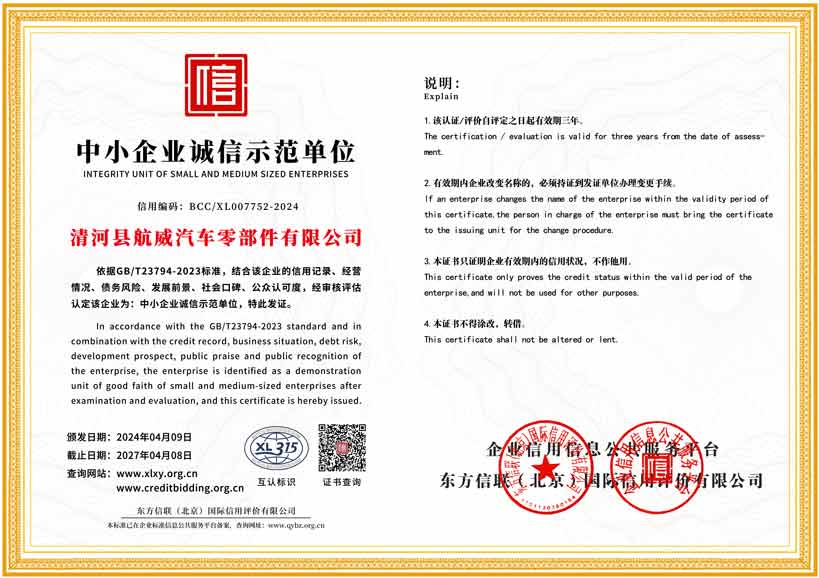clutch fluid line
Understanding Clutch Fluid Lines Importance, Function, and Maintenance
The clutch system in a vehicle plays a crucial role in its operation, allowing drivers to smoothly engage and disengage the engine from the transmission. One of the essential components of this system is the clutch fluid line, which is responsible for transferring hydraulic fluid to activate the clutch mechanism. In this article, we will delve into the importance, function, and maintenance of clutch fluid lines.
The Importance of Clutch Fluid Lines
Clutch fluid lines are vital for the proper functioning of a hydraulic clutch system. They connect the master cylinder, which is operated by the driver’s foot, to the slave cylinder, which actuates the clutch mechanism. The fluid lines must be capable of withstanding high pressure, as they transport hydraulic fluid that transmits the force exerted by the driver’s foot on the clutch pedal. If these lines are compromised, it can lead to a range of issues, from minor inconveniences to complete clutch failure.
A well-maintained clutch fluid line is essential for ensuring the performance and longevity of the entire clutch system. When the fluid line is free from leaks, blockages, and wear, the hydraulic system operates smoothly, enabling seamless gear changes and overall efficient vehicle operation.
How Clutch Fluid Lines Work
When the driver presses the clutch pedal, the master cylinder generates hydraulic pressure. This pressure is transmitted through the clutch fluid line to the slave cylinder, which pushes a fork or a lever to disengage the clutch. Once the pedal is released, the pressure is relieved, allowing the clutch to engage again.
The hydraulic fluid used in this process must meet certain specifications, typically being resistant to high temperatures and capable of maintaining consistent viscosity under varying operating conditions. Common fluids used include mineral oil-based fluids and synthetic hydraulic fluids, both of which provide the necessary properties for effective clutch operation.
Common Issues with Clutch Fluid Lines
Over time, clutch fluid lines can experience wear and tear due to exposure to heat, moisture, and various contaminants. Some common issues associated with malfunctioning clutch fluid lines include
1. Leaks A leak in the fluid line can lead to a drop in hydraulic pressure, causing the clutch to become unresponsive. Drivers may notice a spongy or soft pedal feel, indicating that the hydraulic fluid is not sufficiently pressurizing the system.
clutch fluid line

2. Clogging Dirt, debris, or degraded fluid can clog the lines, preventing fluid from flowing freely. This can result in difficulties when attempting to engage or disengage the clutch, leading to erratic vehicle behavior.
3. Corrosion If the fluid lines are made of metal, they may be susceptible to corrosion, especially if moisture enters the system. Corroded lines can weaken and eventually fail, necessitating timely replacement to avoid more significant issues.
Maintenance of Clutch Fluid Lines
To maintain the health of clutch fluid lines, regular checks and routine maintenance are essential. Here are some tips for ensuring the longevity and efficiency of your clutch’s hydraulic system
1. Regular Inspections Periodically inspect the clutch fluid lines for visible signs of wear, leaks, or corrosion. Look for any fluid pooling around the components, which can signify a problem.
2. Fluid Replacement Hydraulic fluid can degrade over time, losing its effectiveness. Ensure that the clutch fluid is replaced according to the manufacturer’s recommendations, typically every 2 years or 24,000 miles, whichever comes first.
3. System Bleeding If air enters the hydraulic system, it can affect clutch performance. Bleed the system periodically or whenever maintenance is performed to ensure that the system is free of air bubbles.
4. Professional Servicing If you suspect any issues with the clutch fluid lines, it is wise to consult a professional mechanic. They can perform thorough inspections and repairs, ensuring that your clutch system remains in good working order.
Conclusion
Clutch fluid lines are integral to the functioning of a hydraulic clutch system. Proper maintenance and timely inspections can prevent minor issues from escalating into major problems, ensuring that your clutch system operates seamlessly. By understanding the importance of these components and attending to their upkeep, drivers can enhance their vehicle's performance and longevity, ultimately leading to a safer driving experience.
-
Workings of Clutch Pipe and Hose SystemsNewsJun.04,2025
-
The Inner Workings of Hand Brake Cable SystemsNewsJun.04,2025
-
The Secrets of Throttle and Accelerator CablesNewsJun.04,2025
-
The Hidden Lifeline of Your Transmission Gear Shift CablesNewsJun.04,2025
-
Demystifying Gear Cables and Shift LinkagesNewsJun.04,2025
-
Decoding Clutch Line Systems A Comprehensive GuideNewsJun.04,2025
